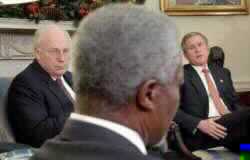The United States and top Middle East mediators on Friday called for an immediate truce between Israel and the Palestinians, and said peace plans including creation of a Palestinian state were nearly complete. But the so-called quartet of mediators -- the United States, the European Union, Russia and the United Nations -- said peace plans were unlikely to be presented until after Israeli elections in late January.
The quartet issued a statement appealing for "an immediate, comprehensive, cease-fire" to be followed by Israeli withdrawal from areas occupied since a Palestinian uprising began in the West Bank and Gaza Strip in September 2000.
At least 1,730 Palestinians and 671 Israelis have died in the Palestinian uprising.
"It is in everybody's best interests that there be two states living side by side in peace and this government will work hard to achieve that," President Bush said.
The mediators promised to quickly complete a "road map," which lays out steps both sides must take to put peace talks back on track.
"The United States is committed to its completion; we are committed to its implementation in the name of peace," Bush told reporters.
UNITED STATES PREVAILS
The United States had been alone in backing an Israeli request to go slow on the plan until after its election. But the informal group works by consensus and the United States prevailed on other members for a delay.
Arab and European governments had argued Israelis should know the solution the international community was proposing before going to the polls.
One of the European Union leaders, Danish Foreign Minister Per Stig Moeller, said he was not discouraged, telling reporters after the meeting that the text had been finalized except for monitoring mechanisms.
LABOUR CLOSES GAP ON LIKUD
Opinion polls in Israel's two biggest newspapers showed a corruption scandal had weakened Prime Minister Ariel Sharon's Likud party in the general election race.
But the surveys indicated the right-wing Likud was still on course to lead the next government. Its main rival, the Labor party under dovish ex-general Amram Mitzna, is pushing a platform of territorial compromise as part of peace efforts.
Sharon, who holds Palestinian President Yasser Arafat responsible for resistance attacks, has balked at the reciprocal moves required by the peace plan.
Setting himself apart, Mitzna has said that, if elected, he would withdraw troops from the Gaza Strip and eventually the West Bank, territories Israel captured from Egypt and Jordan in the 1967 war and which the Palestinians want for a state.
Washington has made the ousting of Arafat a precondition for progress toward peace.
The former resistance leader rejects charges he is responsible for attacks against Israeli civilians in the Palestinian uprising. Under international and domestic pressure for reform, he has called a general election for January 20.
Security issues had dominated the Israeli election campaign until a bribery scandal exploded in Sharon's party last week.
Police are investigating allegations that Likud activists demanded cash and favors in return for swinging the vote in an internal ballot to decide the party's list of parliamentary candidates earlier this month.
"The price of corruption," read the headline over a Hahadash poll in Maariv newspaper, projecting Likud would get 35 seats in the 120-member parliament, a drop of four since the last survey.
A poll in Israel's biggest newspaper, Yedioth Ahronoth, gave Likud 33 seats, a loss of five since the scandal erupted
ARAFAT TOLD TO DELAY ELECTION
But the Palestinian central election committee formally recommended on Friday that Arafat delay the ballot, citing the difficulty of holding it while Israeli forces remained in cities reoccupied in response to Palestinian resistance attacks in Israel.
PHOTO CAPTION
President Bush and Vice President Dick Cheney listen to United Nations Secretary General Kofi Annan during a meeting with the Quartet Principals, Friday, Dec. 20, 2002, in the Oval Office at the White House. The Bush administration joined with its European, Russian and U.N. partners Friday in pursuing potential pathways to Mideast peace but deferred a detailed plan until after Israel's elections in January. (AP Photo/Susan Wals
- Author:
& News Agencies - Section:
WORLD HEADLINES


 Home
Home Discover Islam
Discover Islam Quran Recitations
Quran Recitations Lectures
Lectures
 Fatwa
Fatwa Articles
Articles Fiqh
Fiqh E-Books
E-Books Boys & Girls
Boys & Girls  Hajj Rulings
Hajj Rulings Hajj Fatwas
Hajj Fatwas














